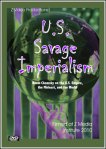What We Are Reading
Below is a list of books that we have read in recent weeks. The comments are not a review of the books, instead sort of an endorsement of ideas and investigations that can provide solid analysis and even inspiration in the struggle for change. All these books are available at The Bloom Collective, so check them out and stimulate your mind.
The Ecological Rift: Capitalism’s War on the Earth, by John Bellamy Foster, Brett Clark and Richard York – Humanity in the twenty-first century is facing what might be described as its ultimate environmental catastrophe: the destruction of the climate that has nurtured human civilization and with it the basis of life on earth as we know it. All ecosystems on the planet are now in decline. Enormous rifts have been driven through the delicate fabric of the biosphere. The economy and the earth are headed for a fateful collision—if we don’t alter course. In The Ecological Rift: Capitalism’s War on the Earth, environmental sociologists John Bellamy Foster, Brett Clark, and Richard York offer a radical assessment of how capitalism is inherently destructive to the environment. The authors also look at the arguments that free market apologists offer for what is now called Green Capitalism.
Pakistan: Democracy, terrorism, and the Building of a Nation, by Iftikhar Malik – As the fall-out of the US-led “war on terror” continues to destabilize the countries of the Indian subcontinent, Pakistan and its fate are never out of the headlines. How did this predominantly Muslim country of 175 million reach this critical state? And what does the future hold in the face of such political and social upheaval? This clear, comprehensive book synthesizes the complex issues facing Pakistan today while remaining cautiously optimistic about the future of a pluralistic nation caught between civic and military imperatives. Professor Malik examines: the country’s strategic geopolitical position; the main characters who have shaped the nation; the legacy of Partition and the role of civil society as a force for change; the vexing problems of good governance; and the parts played by Political Islam and Jihadi extremism, and by the West in its use of Pakistan as a buffer state. This is an excellent book for those wanting to have a better understanding of the US Af-Pak war.
Dispossessing the Wilderness: Indian Removal and the Making of the National Parks, by Mark David Spence – A landmark historical reconstruction of a forgotten story–the eviction of American Indians from a troika of our nation’s major parks: Yosemite, Yellowstone, and Glacier. Spence documents the separate but symbiotic developments of the Indian reservation and recreational park systems, the former to corral Indians, the latter to sequester nature. Spence underpins his three compelling narratives with a clear exposition of the evolving ‘wilderness’ and ‘preservationist’ ideologies, which spelled exclusion for Indian residents of these natural wonders. His riveting chronicle concludes with current tensions, as Indians are attempting to reclaim special rights to these sacrosanct areas and parks are struggling to correct a century of native dispossessions and misrepresentations of the cultural/historical record.
U.S. Savage Imperialism: Noam Chomsky on the U.S. Empire, the Mideast, and the World – In a talk at Z Media Institute 2010, Noam Chomsky begins by comparing the similarity between the U.S. founding mission to be an empire of the chosen, with Israel’s mission. He cites the U.S. self-proclaimed “humanitarian mission” to help the native population by exterminating or removing it. He then talks of the manifest destiny, its preference for settler colonialism, which he calls the most savage kind of imperialism, and the importance of the Mideast in establishing U.S. world dominance. DVD includes talk (65 minutes) and Q&A on the environment, activism, and other topics (56 minutes).



